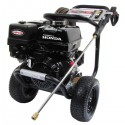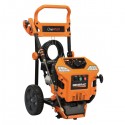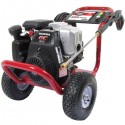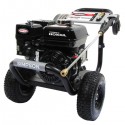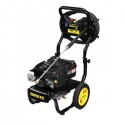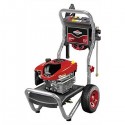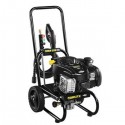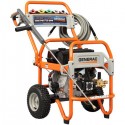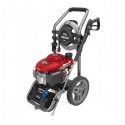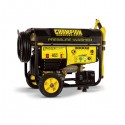Gas Pressure Washer Buying Guide
These are the 10 best gas pressure washers based on product quality, customer satisfaction, and price:
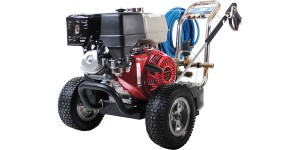 When you have a big cleanup job to take care of, you want the kind of machine in your garage that is going to be able to handle any mess you can throw at it. You never know when the next big job is right around the corner, whether it is pressure cleaning a tough oil or grease stain out of your concrete garage floor or driveway or washing off the SUV or Hummer that put it there. Gas powered pressure washers pack the kind of versatile performance and high level power that you want for these kinds of jobs.
When you have a big cleanup job to take care of, you want the kind of machine in your garage that is going to be able to handle any mess you can throw at it. You never know when the next big job is right around the corner, whether it is pressure cleaning a tough oil or grease stain out of your concrete garage floor or driveway or washing off the SUV or Hummer that put it there. Gas powered pressure washers pack the kind of versatile performance and high level power that you want for these kinds of jobs.
Gas pressure washers are available in residential and commercial grade designs, and either one packs a lot of power. Residential gas pressure washers provide sprays of water with pressures that approach and often exceed 3,000 pounds per square inch, and commercial pressure washers can provide PSI far beyond that. Whatever the job is that you need to tackle, a gas pressure washer can definitely get it done quickly and efficiently.
Gas pressure washers come in a number of different shapes and sizes, and it can be a difficult task to figure out which one has the kind of specifications you need for the kinds of jobs you might be using it for. Are you a homeowner with a big house and yard? Then a residential gas pressure washer is going to be just right for you. Are you a small scale contractor, or do you own your own landscaping business? Then you are probably going to want a commercial grade gas pressure washer.
But it is not as simple as just deciding to buy a residential or commercial gas pressure washer and calling it a day. Within each category there are a wide variety of different models, with wildly varying price ranges. You have to choose the right one for you very carefully – buying a gas pressure washer is a pretty big investment, and you do not want to be stuck with a machine that cannot do the job for you correctly.
However, by applying a number of fairly basic specifications you can narrow down your search considerably and be certain you are getting the right gas pressure washer for your price range and needs. For starters, of course, you will have to decide how much money you are able and willing to spend on a new gas pressure washer. This can depend on whether you are buying it as a business expense or for use around the home.
Whatever kinds of jobs you need a gas pressure washer for, there is going to be one out there for you, though. And once you know what you need to look for, the task of finding the right gas pressure washer for you is going to be fairly easy. Pretty soon you will be able to tell almost at a glance whether a pressure washer fits the specifications that make it the right one for you. But before you get there, you have to consider whether a gas pressure washer is the right buyer’s choice for you.
1. Gas Pressure Washer is a Good Buyer’s Choice
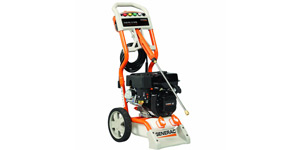 The fact is, a gas pressure washer is indeed a good buyer’s choice. There are a number of reasons why this is the case. The first is pretty simple: in a word, it’s power. Gas pressure washers have the most powerful sprays and the highest cleaning power ratings of any machine on the market. This is true whether they are residential or commercial grade gas pressure washers. Because of their powerful engines, gas pressure washers can produce higher PSIs and support flow rates with volumes that are considerably higher than anything that’s available on electric pressure washers today.
The fact is, a gas pressure washer is indeed a good buyer’s choice. There are a number of reasons why this is the case. The first is pretty simple: in a word, it’s power. Gas pressure washers have the most powerful sprays and the highest cleaning power ratings of any machine on the market. This is true whether they are residential or commercial grade gas pressure washers. Because of their powerful engines, gas pressure washers can produce higher PSIs and support flow rates with volumes that are considerably higher than anything that’s available on electric pressure washers today.
Because they pack so much more power than electric pressure washers, gas pressure washers have a greater range of ability and are far more versatile machines. Around the house, gas pressure washers can accomplish everything electric pressure washers can, and then some. You can hose down your driveway, brick walls, fences and decks with gas pressure washers quickly and efficiently. That is because the higher flow rates allow them to support sprays that have high PSIs but are also much wider than on electric pressure washers, so jobs can be finished in much less time with gas pressure washers.
Gas pressure washers have a considerable range of motion as well, which helps make them more versatile for difficult big jobs: if you are using your gas pressure washer to clean the second story windows on your home, you do not have to worry about being tethered to a power outlet by the garage. You can move all the way around your home without giving it a second thought.
This is particularly useful when you need a gas powered pressure washer for contracting and landscaping jobs. You can just unload the machine from your truck, take it on to the job site and start it right up. You do not have to worry about whether the job site is wired for power yet or if an extension cord is going to reach all the way to the back of the garden. This is particularly convenient on construction sites, which are almost never independently wired for power, or landscaping jobs on public parks or other large sites, where the nearest outlet could be a quarter of a mile away.
And speaking of contracting jobs: for these you are almost always going to want to have a gas pressure washer in your truck, not an electric one. That is not just because of their range of motion, either. The high PSI and flow rate mean that gas pressure washers can more easily strip loose paint off of walls and blast stains from concrete. With a gas pressure washer you can clean up drywall and plaster dust, not to mention any number of other debris, in a matter of minutes.
Without one of these powerful machines at your disposal, you would need a crew of laborers and an hour for cleanup. Stripping paint can take up to an entire day, depending on the size of the job. With a gas pressure washer it is finished in a matter of an hour or two, and you can get on with the rest of the job.
Another reason gas pressure washers are so much more versatile than anything else on the market is because they can run hot or cold water. That’s right: with a gas pressure washer, you can produce a spray of water that is from 180 to 200 degrees Fahrenheit. That kind of hot water is extremely useful for tackling very tough stains that cold water alone would take much longer to deal with.
In any new household appliance or power tool, the more options you have with it, the more jobs it is going to be able to take care of. It is always better to have a small set of tools that can accomplish a wide variety of jobs than to have to carry dozens of highly specialized – and very limited – tools around with you. If you are drawing power to run the tool, it should be able to do a lot more than a manual tool can. And when it comes to pressure washers, versatile options mean a range of PSI as well as a range of temperatures to choose from for the water spray.
The hot water can break down stains, layers of dirt or grime, and organic discoloration caused by mold much more quickly than a cold water spray could. And whether you are using your gas pressure washer for residential or professional applications, it is all about saving yourself time and energy. So why not get the pressure washer that can finish the job as quickly as possible?
Gas pressure washers also have the kind of tough engines and heavy duty design and manufacturing that will allow them to stand up to serious jobs repeatedly over the long term. Whether you are using your gas pressure washer around the home or on the job site, you want it to be very tough. You do not want a delicate machine that is going to break down after a couple years of use, and you do not want a pressure washer that is made out of parts that will crack or break after getting bumped or dinged. Job sites are busy places, and you never know when something might go wrong. So you want a pressure washer that is tough and durable.
No matter what your intended use is for the gas pressure washer, whether it is residential or professional, and regardless of what your price range is, there is going to be a gas pressure washer out there that is just right for you – I guarantee it. Finding the right one is simply a matter of applying several buying specifications to determine whether one particular model really is better than the rest of the competition. And once you have got your new gas pressure washer in your garage or work truck, you will agree that it was a good buyer’s choice.
2. Gas Pressure Washer Buying Specifications
2a. High PSI and Flow Rate
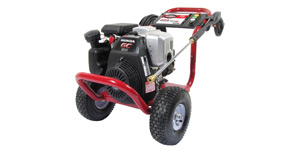 In any pressure washer, a high PSI and flow rate are going to be the very first things you should look at. This is especially true for gas pressure washers; the entire reason for getting a powerful gas pressure washer instead of an electric one is because these machines are able to provide much higher PSI and flow rates. So there is no good reason to spend extra money on a gas pressure washer if you are not going to try to find the one with the highest PSI and flow rate.
In any pressure washer, a high PSI and flow rate are going to be the very first things you should look at. This is especially true for gas pressure washers; the entire reason for getting a powerful gas pressure washer instead of an electric one is because these machines are able to provide much higher PSI and flow rates. So there is no good reason to spend extra money on a gas pressure washer if you are not going to try to find the one with the highest PSI and flow rate.
Try to avoid looking at PSI by itself. While the pounds per square inch is a good indicator of how much force the strongest spray setting is going to provide, it does not alone determine the pressure washer’s cleaning ability.
The flow rate is just as important as the PSI. The gallons per minute that are flowing through the hose determine how wide the spray with the highest PSI is going to be. You want a wider spray along with that high pressure so you can finish big jobs quickly. Multiply the PSI by the flow rate for a measure of the cleaning power the machine is able to offer.
2b. A Powerful Engine Made by a Trusted Manufacturer
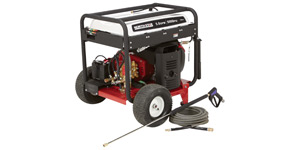 But all of the pounds per square inch and gallons per minute in the world are not going to mean a whole heck of a lot if they are not backed up by a robust, powerful engine. You want to make sure that the engine in your gas pressure washer has what it takes to provide serious cleaning power over the long term. For starters, make sure it is made by a trusted manufacturer, such as Briggs & Stratton, Kawasaki or Honda.
But all of the pounds per square inch and gallons per minute in the world are not going to mean a whole heck of a lot if they are not backed up by a robust, powerful engine. You want to make sure that the engine in your gas pressure washer has what it takes to provide serious cleaning power over the long term. For starters, make sure it is made by a trusted manufacturer, such as Briggs & Stratton, Kawasaki or Honda.
Then, take a look at the engine’s product specs. You want it to have a fairly large displacement and Horsepower. Displacement, measured in cubic centimeters (ccs), tells you how much volume the engine’s pistons are sweeping on each cycle. It should be at least 200 ccs. And the horsepower (HP) is a general measure of the gas pressure washer’s total power. Look for the one in your price range with the highest displacement and HP.
Also, look at whether the engine is 2-cycle or 4-cycle. A 2-cycle engine will generally not be as powerful, but it will also be less noisy, produce fewer emissions, and generally require less maintenance to keep it running smoothly. Which one is right for you is a personal choice.
2c. Quality Parts and Manufacturing Design
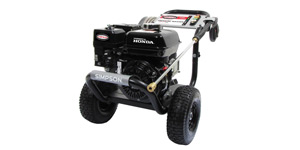 You do not just want your gas pressure washer to have a powerful engine and high PSI and flow rate, you also want to make sure that it is made with the kind of parts and quality manufacturing that will make sure it can hold up to the rigors of whatever kinds of jobs you will be using it for. Whether you intend to use your gas pressure washer for residential jobs only, or if you are going to be taking it onto job sites for consistent, heavy-duty use, you want to be certain that the materials it is made up will hold up over the long term.
You do not just want your gas pressure washer to have a powerful engine and high PSI and flow rate, you also want to make sure that it is made with the kind of parts and quality manufacturing that will make sure it can hold up to the rigors of whatever kinds of jobs you will be using it for. Whether you intend to use your gas pressure washer for residential jobs only, or if you are going to be taking it onto job sites for consistent, heavy-duty use, you want to be certain that the materials it is made up will hold up over the long term.
In a word, you want one thing: steel. Stamped steel parts are good – they may get dinged from occasional bumps or collisions, but they will hold up. Welded steel is even better; you know that there is very little that can damage a welded steel frame and body. The tires should be made of tough pneumatic rubber, and be big and wide so they can provide more stability and traction. And the connections for hose intakes and outflows should be made of brass – no exceptions. You want a machine that won’t leak and that you can rely on.
2d. Excellent Fuel Efficiency and Low Emissions
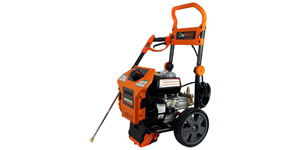 Gas prices are high these days – much higher than ever before. If you are using your gas pressure washer a lot, you are going to want it to have the kind of fuel efficiency that will not be burning through gallons and gallons of gasoline every week – especially if you own a small business with thin margins. Try to find a machine that has a powerful engine but that is also fairly fuel efficient so that this will not be a problem that you have to deal with.
Gas prices are high these days – much higher than ever before. If you are using your gas pressure washer a lot, you are going to want it to have the kind of fuel efficiency that will not be burning through gallons and gallons of gasoline every week – especially if you own a small business with thin margins. Try to find a machine that has a powerful engine but that is also fairly fuel efficient so that this will not be a problem that you have to deal with.
Higher fuel efficiency usually goes hand in hand with another big advantage: reduced carbon emissions. These days, concern about the amount of carbon emissions we are putting into the environment, and its effect on global climate patterns, is at an all-time high. As a result, in a number of states, the California Air Resources Board’s emissions standards for small engine machines are being enacted.
If you live in one of the fourteen states that applies CARB-compliance regulations, you are going to need to find a gas pressure washer that is up to them. Otherwise you will be out of luck as far as purchasing or using the gas pressure washer that you want.
2e. Useful Accessories and Thoughtful Design Features
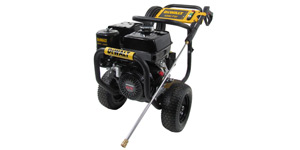 So, now you know the Big Four buying specifications that you can use to determine whether a gas pressure washer is right for you. These can seriously narrow down your selections to a short list of just a few gas pressure washers. But now you have to figure out exactly which model is best for you. How do you do that? Look at their accessories and design features.
So, now you know the Big Four buying specifications that you can use to determine whether a gas pressure washer is right for you. These can seriously narrow down your selections to a short list of just a few gas pressure washers. But now you have to figure out exactly which model is best for you. How do you do that? Look at their accessories and design features.
A gas pressure washer will be much easier to use if it has thoughtful design features. There should be a crank-operated mechanism for rolling up the hose and a compartment for storing the spray wand. The wand should have as many options for changing the PSI as possible, meaning multiple spray nozzles.
There should be an onboard reservoir for detergent or chemical solvents – and preferably two. Even better if there is a dial you can use to adjust the level of soap that is entering the water spray. And you should have a range of options for temperature and flow rate as well.
If possible, you want your gas pressure washer to be lightweight and compact so that it is easier to store and maneuver in and out of your garage or work truck. And the hose should be at least 25 feet long so that you can easily move around the work site without having to drag the machine with you everywhere you go.
These are the 10 best gas pressure washers based on product quality, customer satisfaction, and price:

